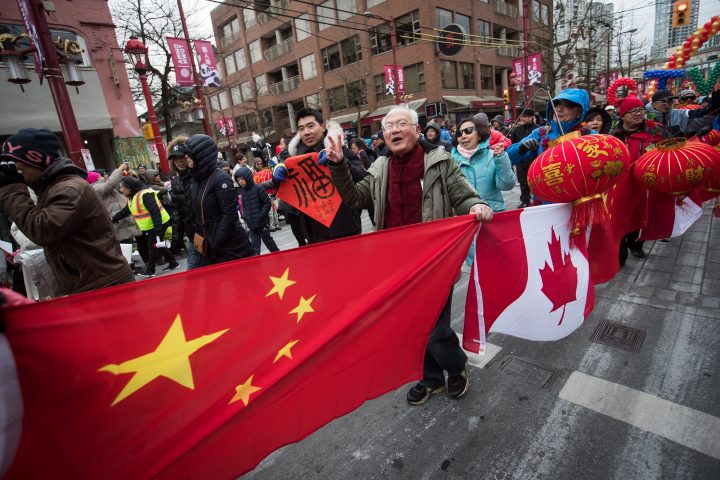Some of the federal government’s top bureaucrats have been warned about China and India trying to use their respective ethnic communities in Canada to advance their own agendas.

The stark warning is in a secret report prepared for deputy ministers attending a retreat on national security last year that also pointed out the challenge in preventing foreign countries from launching “hostile-state activity” against Canada.
READ MORE: Sikh Indian minister slams Trudeau Liberals over ‘knee-jerk’ changes to terrorism report
Such actions include cyberattacks, efforts to spread misinformation and using diaspora communities, either directly or indirectly, to steal technology, influence elections and target Canada’s economy, infrastructure and democratic institutions.
Obtained by The Canadian Press through the access-to-information law, the report’s release comes ahead of a federal election in which Canada’s relations with China and India as well as fears of foreign-government interference are likely to figure prominently.
In the past week, the Canadian branch of a Sikh group, Sikhs for Justice, filed a defamation suit against the Indian government — headed by Hindu nationalist prime minister Narendra Modi — over stories in Indian media suggesting Canadian Sikhs are behind terrorist acts in India in pursuit of an independent Sikh homeland carved out of Indian territory.
WATCH: Photographs show MP endorsed China-Canada sporting event in Richmond sponsored by top suspects in RCMP money laundering probe

Shortly afterward, the Indian government banned Sikhs for Justice, outlawing it for five years.
Separately, the World Sikh Organization in Canada in April sent Public Safety Minister Ralph Goodale a letter flagging the arrest of a couple in Germany who were accused of spying on Sikhs and Kashmiris in that country while the organization’s lawyer, Balpreet Singh, said Friday that there seem to be recent efforts to pit Hindus and Sikhs against each other in Canada.
“The Indian government is not that bold that they would do it that overtly, but we suspect it has links to that,” he added.

Get daily National news
READ MORE: China has ‘hard time’ grasping why Canada is caught in its trade war: McNeil
Yet one expert on the role of diasporas in Canadian politics says while there might be legitimate concerns about Chinese and Indian influence in Canada, the reality is that Canada has a long history of different ethnic communities working on behalf of their native countries.
“The reason they picked these two countries is because the numbers are fairly significant,” said David Carment, who has done extensive research on diaspora politics for Carleton University’s Norman Paterson School of International Affairs.
“And I think there’s kind of a fear-factor here because they really don’t know the extent to which this is going to influence Canadian politics down the road.”
READ MORE: Feds announce $8.3M in support for beef industry amid standoff with China
Entitled “Countering Hostile State Activity: The Canadian Perspective” and dated March 2018, the report focuses extensively on new risks Canada and its Five Eyes partners — the U.S., U.K., Australia and New Zealand — face from abroad.
“Under the rubric of ‘hybrid or asymmetric or information warfare,’ adversarial states have increased the use of covert technical and human-based intelligence platforms to advance their security, defence, economic or foreign-policy objectives,” it reads.
“What qualifies these as ‘hostile-state activity’ is that, in each case, these operations are calculated to undermine or harm our interests, as well as those of our allies.”
WATCH: Canadian politicians should pay attention to sensitivities around India-Canada relations: Dosanjh

While the report lists several countries that officials consider threats to Canada, most of those references, along with many other details, were blacked out before the document was released.
However, one section specifically mentions the 1.8 million Canadians of Chinese descent and 1.2 million of Indian descent in the context of foreign governments trying to “directly and indirectly work to influence diaspora communities across the country.”
“The increasing political participation of these communities at all levels of government is both laudable and reflective of the increasing diversity of the Canadian political system,” the report says of Chinese and Indo-Canadians.
READ MORE: International student arrested, facing deportation for working too many hours
However, it adds: “The risk of these communities being influenced, overtly or covertly, by foreign governments with their own agendas cannot be overlooked.”
It goes on to state that “the lines between legitimate advocacy and lobbying and pressures imposed to advance the economic and political interests of foreign actors are becoming increasingly blurred.”
The rest of the section is largely blacked out, including any possible measures to prevent or detect such attempts.
Concerns about Chinese influence in Canada are not new, Carment said, but “what we’re talking about in this case is a ‘fifth column’ of individuals who are sort of mobilized for the purposes of undermining or influencing or affecting the government.”
WATCH: China says ‘Canada is to blame’ for problems in relationship

Without evidence, it’s hard to tell how legitimate such concerns truly are, Carment added, though he did have concerns about a “black-and-white” view of different communities seeping into Canada’s intelligence community and senior government ranks.
The report also speaks about the difficulties Canada and its Five Eyes allies face in deterring foreign governments from targeting them because the “punitive consequences” have “not kept pace with the evolving nature and deniability of the threat.”
READ MORE: China-Canada differences run much deeper than outgoing ambassador: minister
Contributing to the problem, the report says, “many threat actors are adept at leveraging the restraint mechanisms inherent in democratic systems to their advantage.”
The report does provide a list of potential responses, including sanctions, economic penalties, public naming and shaming and criminal investigations, though such responses would need to be determined on a case-by-case basis.







Comments
Want to discuss? Please read our Commenting Policy first.